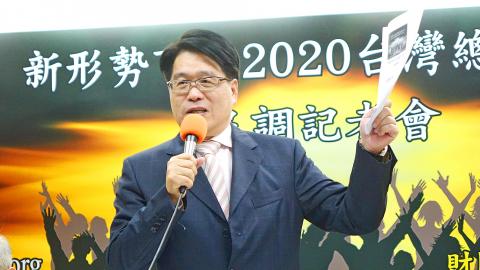President Tsai Ing-wen (蔡英文) would win in a three-way presidential race against independent Taipei Mayor Ko Wen-je (柯文哲) and Kaohsiung Mayor Han Kuo-yu (韓國瑜) or Hon Hai Precision Industry Co founder Terry Gou (郭台銘), who are vying for the Chinese Nationalist Party’s (KMT) nomination, a survey released by the Taiwanese Public Opinion Foundation showed yesterday.
In a race between Tsai, Han and Ko, 36.9 percent of respondents said they would vote for Tsai, while 29.4 percent preferred Han and 27.5 percent chose Ko.
In such scenario, Ko would have an “absolute advantage” with voters under 40, but would be at a disadvantage when it comes to voters aged 55 or older, the survey said.

Photo: George Tsorng, Taipei Times
Han would be more popular among voters aged 45 to 60, and Tsai with those 60 or above, it said.
If the KMT were to nominate Gou, who on Friday resigned as company chairman, Tsai would still win next year’s presidential election with 35.5 percent of votes, compared with 28.1 percent for Ko and 26.1 percent for Gou, the poll showed.
Sixty-seven percent of Democratic Progressive Party (DPP) supporters would vote for Tsai, while 54 percent of KMT supporters would vote for Gou, it found.
In addition to having the support of 37 percent of independent voters, Ko would have the support of 32 percent of KMT supporters and 23 percent of DPP supporters, suggesting that if Gou were to represent the KMT, more KMT supporters would vote for Ko, it said.
The foundation also revealed how prospective candidates scored on the “feeling thermometer,” which measures politicians’ popularity.
Ko, Tsai, Gou and Han received average scores of 56.93, 55.16, 49.27 and 43.79 respectively, while former premier William Lai (賴清德), who lost to Tsai in the DPP’s presidential primary, received 58.27.
A score lower than 50 indicates a “cold” public attitude toward the politician, foundation chairman Michael You (游盈隆) said.
The foundation also surveyed the approval rating of the Tsai administration and found that nearly 48 percent of respondents approved of the way Tsai handles national affairs, while 44 percent disapproved.
The finding shows that Tsai’s approval rating, which had been low for a long time, has turned around, the survey said.
The poll also showed that 52 percent of respondents were satisfied with Premier Su Tseng-chang’s (蘇貞昌) performance, while 38 percent were dissatisfied.
Meanwhile, Gou is leading the KMT primary with 29 percent support, compared with former New Taipei City mayor Eric Chu’s (朱立倫) 26.7 percent, Han’s 26.4 percent, former Taipei County commissioner Chou Hsi-wei’s (周錫瑋) 2.3 percent and National Taiwan University political science professor Chang Ya-chung’s (張亞中) 0.5 percent, the survey found.
The poll, conducted on Monday and Tuesday last week, was commissioned by the foundation and conducted nationwide by Focus Survey Research.
It targeted adults over the age of 20 via landlines, collected 1,092 valid samples and had a margin of error of 2.97 percentage points.

Taipei has once again made it to the top 100 in Oxford Economics’ Global Cities Index 2025 report, moving up five places from last year to 60. The annual index, which was published last month, evaluated 1,000 of the most populated metropolises based on five indices — economics, human capital, quality of life, environment and governance. New York maintained its top spot this year, placing first in the economics index thanks to the strength of its vibrant financial industry and economic stability. Taipei ranked 263rd in economics, 44th in human capital, 15th in quality of life, 284th for environment and 75th in governance,

Greenpeace yesterday said that it is to appeal a decision last month by the Taipei High Administrative Court to dismiss its 2021 lawsuit against the Ministry of Economic Affairs over “loose” regulations governing major corporate electricity consumers. The climate-related lawsuit — the first of its kind in Taiwan — sought to require the government to enforce higher green energy thresholds on major corporations to reduce emissions in light of climate change and an uptick in extreme weather. The suit, filed by Greenpeace East Asia, the Environmental Jurists Association and four individual plaintiffs, was dismissed on May 8 following four years of litigation. The

A former officer in China’s People’s Liberation Army (PLA) who witnessed the aftermath of the 1989 Tiananmen Square massacre has warned that Taiwan could face a similar fate if China attempts to unify the country by force. Li Xiaoming (李曉明), who was deployed to Beijing as a junior officer during the crackdown, said Taiwanese people should study the massacre carefully, because it offers a glimpse of what Beijing is willing to do to suppress dissent. “What happened in Tiananmen Square could happen in Taiwan too,” Li told CNA in a May 22 interview, ahead of the massacre’s 36th anniversary. “If Taiwanese students or

The New Taipei City Government would assist relatives of those killed or injured in last month’s car-ramming incident in Sansia District (三峽) to secure compensation, Mayor Hou You-yi (侯友宜) said yesterday, two days after the driver died in a hospital. “The city government will do its best to help the relatives of the car crash incident seek compensation,” Hou said. The mayor also said that the city’s Legal Affairs, Education and Social Welfare departments have established a joint mechanism to “provide coordinated assistance” to victims and their families. Three people were killed and 12 injured when a car plowed into schoolchildren and their